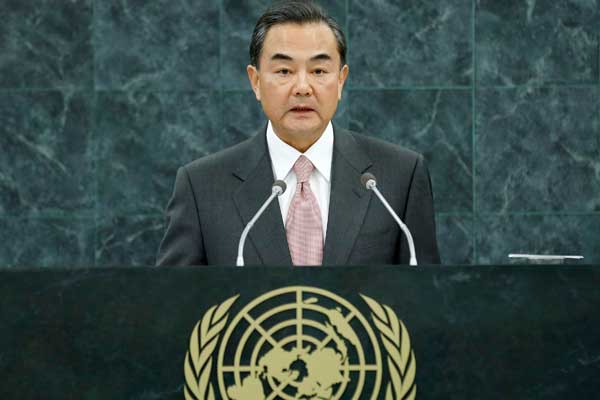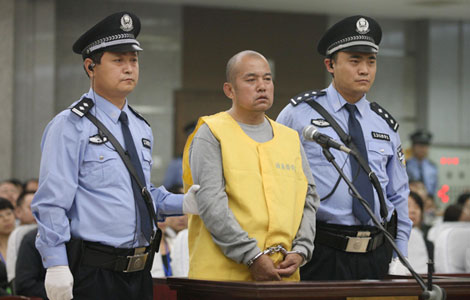

In his first speech at the United Nations' annual debate on Friday, Chinese Foreign Minister Wang Yi emphasized China's development strategies and foreign policies on pressing international issues, including Syria and Iran.
Wang elaborated on China's development plan, which will "stay firmly on the path of peaceful development".
 |
|
Foreign Minister Wang Yi speaks at the General Debate during the 68th UN General Assembly in New York on Friday. [Paulo Filgueiras / UN Photo] |
"As China has enjoyed fast development over the years, some people are concerned that China may repeat the beaten track that a country will inevitably become arrogant and seek hegemony when it grows in strength and becomes powerful. And various versions of the ‘China threat' have surfaced," Wang said.
He made the remarks at the first session of the annual General Assembly he had attended since he assumed his post in March.
"However, what happened in the past cannot be applied indiscriminately to today's China," he added.
Jon Taylor, a political science professor at the University of St. Thomas in Houston, said: "Wang explained China's view of the modern world and its role in it — that US hegemony is over and that we have moved toward a multipolar world."
Wang said the world's second-largest economy will remain committed to "reform, opening up and sustainable development".
He explained China is "deepening economic structural adjustment and accelerating the shift of the growth model".
He said: "In pursuit of progress (made) while maintaining stability, the Chinese government has taken a macro-economic policy that addresses both immediate and long-term needs, and adopted a series of innovative policy measures with a view to ensuring steady growth, adjusting economic structure and promoting reform."
Berkeley College lecturer Ryan Allen said Wang's speech illustrated an important message on the leadership's vision.
"As China becomes more involved in the development of other nations through aid or other types of investment, there will be a greater sense of fear of the unknown," Allen said.
"Wang Yi's message was clear: China is not like past imperial powers."
Zhu Zhiqun, a professor of political science and international relations at Bucknell University in Pennsylvania, said Wang's remarks reassure the international community that China will continue to focus on development and peace and will not seek hegemony.
"China has been criticized by some for not being responsible as a great power," Zhu said.
"Now the new leadership will demonstrate its confidence, maturity and sense of mission as a big power through more positive involvement in international affairs.
"Its approach to territorial disputes with some neighbors is rational and pragmatic, finding a solution through negotiation and consultation. If no easy solution can be found, then shelve the disputes and focus on joint exploration of the resources near the disputed areas."
Zhu said it is noteworthy that the foreign minister said China will "play a more proactive and constructive role in addressing international and regional hotspot issues".
Wang also called for peaceful solutions through dialogue to nuclear issues in Iran and on the Korean Peninsula, adding that China has been working to promote a peaceful settlement of the Iranian nuclear issue through dialogue.
He pointed out in his speech that this is the 10th year of the Six-Party Talks.
"We hope that parties will create conditions, build consensus, work toward the same goal and resume the talks at an early date," he said.
Wang said China "has played a constructive role in seeking a comprehensive, lasting and appropriate solution to the Iranian nuclear issue so as to uphold the international nonproliferation regime and peace and stability in the Middle East".
"China calls for an immediate end to hostilities and violence in Syria so as to create necessary conditions for the verification and destruction of chemical weapons. We call for the early opening of the Geneva II conference and faster progress in a political resolution of the Syrian issue."
Wang said Beijing does not seek national gains in Syria. It respects the Syrian people's aspirations and choices, and China will continue to assist them, including refugees who have fled the country.
The foreign minister called for "an early launch of intergovernmental negotiations on the post-2015 agenda".
"The post-2015 development agenda should continue to focus on development and poverty elimination; give due consideration to national conditions and stages of development in different countries; and respect their independent choices of development paths," Wang said.
Barry Carin, a senior fellow with the Canada-based Center for International Governance Innovation, however, warned the debate will be very difficult.
"We risk a fuzzy outcome rather than a cogent narrative, including vision and principles, together with a limited number of concrete and time-bound commitments," Carin said.







